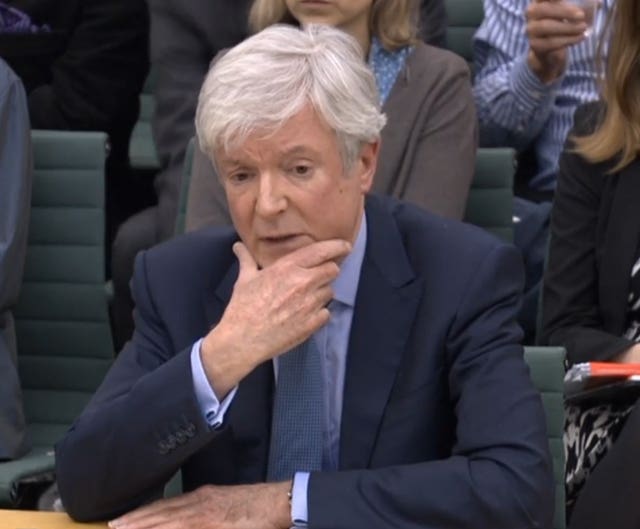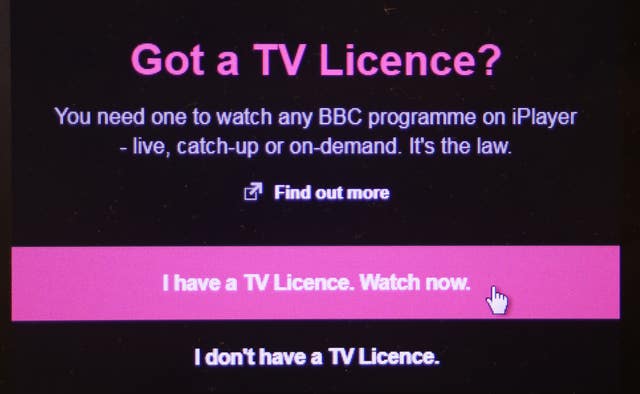
The TV licence fee will increase to £150.50 from £147 from April 1, the Government has announced.
The annual fee for BBC programming increased for the first time since 2010 in 2017 after the Government said it would rise in line with inflation for five years.
The announcement comes as the corporation faces scrutiny over gender pay inequality.
Director-general Lord Tony Hall recently faced questions from MPs about pay imbalance following evidence from Carrie Gracie, who resigned as the BBC’s China editor over unequal pay.
 Sport Committee">BBC director-general Tony Hall gives evidence to the Digital, Culture, Media and Sport Committee on pay at the BBC (PA)
Sport Committee">BBC director-general Tony Hall gives evidence to the Digital, Culture, Media and Sport Committee on pay at the BBC (PA)
Jeremy Vine and John Humphrys are among the top talent who have said they are willing to take a pay cut to contribute to closing the gender pay gap at the corporation.
Anyone watching or recording TV programmes as they are shown on TV, or watching or downloading BBC programmes on iPlayer, must have a licence.
The charge applies whether they are using a TV set, computer, or any other
equipment.
 The BBC iPlayer’s TV licence page (Philip Toscano/PA)
The BBC iPlayer’s TV licence page (Philip Toscano/PA)
Licence fee payers will receive a payment plan or a reminder reflecting the new amount when their licence is next due for renewal.
Those buying or renewing a licence after April 1 will pay the new fee while those already buying a licence on an instalment scheme which started before April 1 – such as monthly direct debit or weekly cash payments – will continue to make payments totalling £147 until their licence comes up for renewal.
TV Licensing, the body tasked with collecting the fee, will be advising licence fee payers due to renew in March to pay on time so that they will pay the current rate of £147.
Those buying a new licence before April 1 will also pay the current rate.


Why are you making commenting on The Herald only available to subscribers?
It should have been a safe space for informed debate, somewhere for readers to discuss issues around the biggest stories of the day, but all too often the below the line comments on most websites have become bogged down by off-topic discussions and abuse.
heraldscotland.com is tackling this problem by allowing only subscribers to comment.
We are doing this to improve the experience for our loyal readers and we believe it will reduce the ability of trolls and troublemakers, who occasionally find their way onto our site, to abuse our journalists and readers. We also hope it will help the comments section fulfil its promise as a part of Scotland's conversation with itself.
We are lucky at The Herald. We are read by an informed, educated readership who can add their knowledge and insights to our stories.
That is invaluable.
We are making the subscriber-only change to support our valued readers, who tell us they don't want the site cluttered up with irrelevant comments, untruths and abuse.
In the past, the journalist’s job was to collect and distribute information to the audience. Technology means that readers can shape a discussion. We look forward to hearing from you on heraldscotland.com
Comments & Moderation
Readers’ comments: You are personally liable for the content of any comments you upload to this website, so please act responsibly. We do not pre-moderate or monitor readers’ comments appearing on our websites, but we do post-moderate in response to complaints we receive or otherwise when a potential problem comes to our attention. You can make a complaint by using the ‘report this post’ link . We may then apply our discretion under the user terms to amend or delete comments.
Post moderation is undertaken full-time 9am-6pm on weekdays, and on a part-time basis outwith those hours.
Read the rules hereLast Updated:
Report this comment Cancel